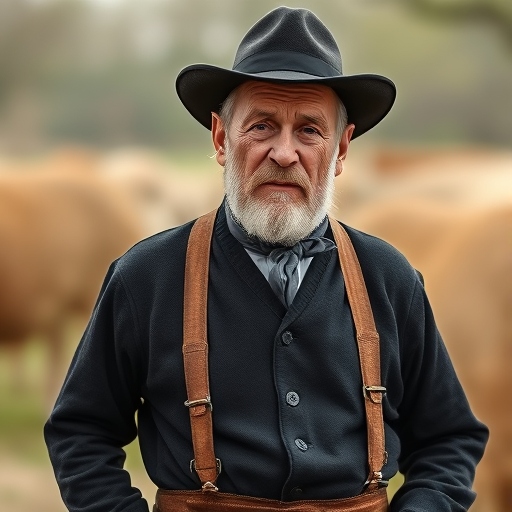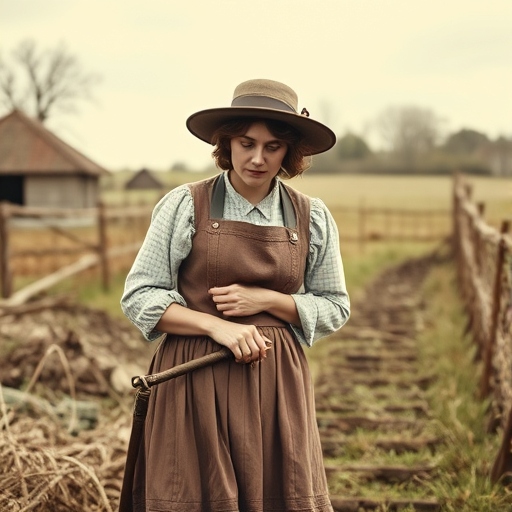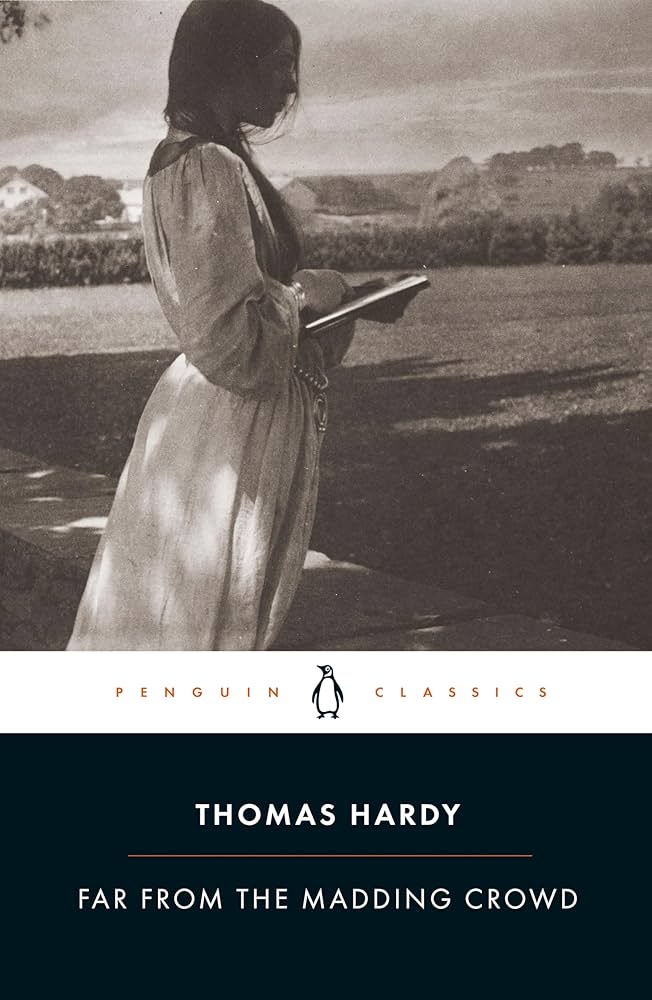Amazing, Brave, Independent Yet Vulnerable: Understanding Bathsheba Everdene's Struggle for Autonomy
Bathsheba Everdene, the unforgettable heroine of Thomas Hardy’s Far from the Madding Crowd, is a character defined by her fierce independence, yet tempered by vulnerability. Bathsheba Everdene stands out in Victorian literature as a woman striving for self-reliance in a world that often confined women to narrow roles. Her journey is one of ambition, passion, and growth, revealing both the strength and complexity of her character.
Bathsheba Everdene: An amazing Woman Ahead of Her Time
When Bathsheba Everdene inherits her uncle’s farm, she immediately makes it clear that she intends to run it herself, refusing to delegate authority or conform to the expected role of a woman as a passive overseer. Bathsheba Everdene’s determination to succeed as a landowner sets her apart in Hardy’s Victorian England, where few women held such positions. Her desire to be taken seriously, as well as her firm belief in her own capabilities, makes her an admirable figure who resonates with readers even today.
Bathsheba Everdene’s independence is both a blessing and a curse. Her confidence and pride in her work often leave her isolated, struggling to balance her responsibilities with her personal desires. Bathsheba’s need to maintain her autonomy drives her decisions, yet she remains painfully aware of the loneliness that accompanies her self-sufficiency.
A Vulnerable Heart: Bathsheba’s Romantic Struggles
While Bathsheba’s professional life reveals her strength, her romantic relationships expose her vulnerabilities. Her interactions with three very different men—Gabriel Oak, William Boldwood, and Sergeant Frank Troy—each reveal a different facet of her personality and desires.
Gabriel Oak, the shepherd turned loyal friend, symbolizes stability and respect. Unlike her other suitors, Gabriel admires Bathsheba’s independence and supports her endeavors without trying to control her. His steadfastness and patience are in stark contrast to the emotional turmoil she experiences with the other men. However, Bathsheba’s initial rejection of him highlights her youthful impulsiveness and her determination to avoid romantic entanglements that might interfere with her autonomy.
In contrast, William Boldwood, a prosperous but reserved farmer, becomes infatuated with Bathsheba after receiving a flirtatious valentine from her. His obsessive love for her is both flattering and unsettling, pushing Bathsheba into a situation where she feels pressured to meet expectations that conflict with her independence. Her interaction with Boldwood demonstrates how her decisions, while assertive, can have unintended consequences that leave her vulnerable to emotional conflict.
Then there is Sergeant Frank Troy, the charming but reckless soldier who captivates Bathsheba with his passion and charisma. Her impulsive marriage to Troy showcases her inner conflict: though she values independence, she is also deeply drawn to the thrill and intensity that Troy offers. However, his manipulative and irresponsible nature ultimately leaves her feeling betrayed and exploited, making her painfully aware of her own emotional naiveté.
The Balancing Act of Independence and Vulnerability
Bathsheba’s story is ultimately a struggle to balance her independence with her longing for love and connection. She is strong and self-reliant, but she is also human, susceptible to emotions and the desire to share her life with someone. Her journey reflects the inherent tension in autonomy: while independence brings freedom, it can also leave one exposed to isolation and the vulnerability that comes from personal choices.
Bathsheba’s vulnerability becomes a source of growth. Her experiences with love and loss teach her humility and self-awareness, helping her to understand that strength doesn’t mean rejecting all help or companionship. By the end of the novel, Bathsheba learns to value the quiet, enduring love offered by Gabriel Oak, choosing a partnership built on respect, loyalty, and shared values rather than impulsive attraction.
Bathsheba Everdene: A Timeless Reflection of Human Complexity
Through Bathsheba Everdene, Thomas Hardy gives readers a heroine who is complex, flawed, and deeply human. Her journey toward self-discovery is one that explores the intricate dynamics of independence, vulnerability, and resilience. Bathsheba’s character serves as a reminder that true autonomy doesn’t mean shutting out others or burying our desires; it means finding balance, learning from experience, and allowing oneself to grow through both strength and vulnerability.
In Far from the Madding Crowd, Bathsheba Everdene stands as a character who reflects the universal struggle for selfhood. Her bold decisions, mistakes, and ultimate growth continue to resonate, showing that independence and vulnerability are not mutually exclusive but rather essential parts of a fully realized life.
Read my blog post on Dostoevsk’s White Nights

Nature as a Reflection of Bathsheba’s Bold Choices in Hardy’s Wessex
In Far from the Madding Crowd, Thomas Hardy’s rich and evocative portrayal of nature is more than just a scenic backdrop; it mirrors the emotions, conflicts, and choices of the novel’s characters. Bathsheba Everdene, the novel’s headstrong heroine, often finds her life, choices, and inner conflicts reflected in the natural landscapes of Hardy’s fictional Wessex. The natural world, with its beauty, power, and unpredictability, becomes a parallel to Bathsheba’s journey and her bold, sometimes reckless decisions.
The Landscape of Wessex: A Mirror for Bathsheba’s Character
Wessex, a fictional setting inspired by Hardy’s native Dorset, serves as more than a physical environment; it shapes the lives and fates of its characters. For Bathsheba, who is both drawn to and defined by her environment, nature symbolizes freedom, independence, and the untamed spirit she embodies. Her interactions with the land—from managing her farm to facing the harsh realities of rural life—reveal her determination to defy convention and take control of her destiny.
As Bathsheba faces life’s trials, the landscape around her seems to respond, almost as if nature itself is intertwined with her emotions and decisions. Hardy’s Wessex is a land of both beauty and cruelty, much like Bathsheba’s own fierce spirit, and it reflects the duality of her character: her strength and resolve as well as her vulnerabilities.
Storms and Passion: Nature Echoing Bathsheba’s Romantic Turmoil
One of the most striking examples of nature reflecting Bathsheba’s life is during the great storm scene, where she and Gabriel Oak work together through the night to save her harvest from the violent winds and rain. This scene symbolizes both her passion and her growing connection with Gabriel. As the storm rages, Bathsheba confronts the consequences of her impulsive choices, particularly her turbulent relationship with Sergeant Frank Troy. The fury of the storm mirrors the chaos Troy brings into her life, reflecting the emotional turmoil she feels and the threat Troy poses to her carefully maintained independence.
The storm also reveals Gabriel’s unwavering loyalty and Bathsheba’s deep-seated respect for him, hinting at a growing recognition of what she truly values in a partner. Hardy’s use of the storm here not only highlights the unpredictability of nature but also underscores Bathsheba’s realization of her own vulnerability and the importance of steady support—a rare moment where she must rely on another’s strength.
Seasons of Change: Bathsheba’s Growth and Maturity
Throughout Far from the Madding Crowd, the changing seasons serve as a metaphor for Bathsheba’s development. The lush, fertile summers parallel her youthful pride and boldness, while the bleak winters signify her moments of introspection and regret. As Bathsheba moves from the vibrancy of spring, symbolizing her initial carefree spirit and independence, to the harsher realities of winter, she matures and learns to reconcile her desires with the demands of life.
One notable example is her relationship with William Boldwood, a stable but ultimately troubled farmer. When Bathsheba sends him a valentine on a whim, her impulsive action ignites his intense obsession with her. The natural world, with its cyclical patterns and moments of volatility, reflects the ripple effects of her decisions, mirroring the unintended consequences of her bold actions. As the seasons change, so does Bathsheba’s outlook on life and love, showing a gradual shift from reckless independence to a more grounded understanding of relationships.
Harvest and Hardship: Bathsheba’s Struggle for Self-Reliance
The farming life that Bathsheba leads is shaped by nature’s demands, and the cycle of planting and harvesting reflects her struggle for self-reliance. Hardy’s portrayal of farm work illustrates her commitment to independence, as she boldly takes on responsibilities traditionally reserved for men. Her willingness to manage the farm herself is a testament to her courage and ambition, aligning her spirit with the resilience of the natural world around her.
However, nature also imposes challenges on Bathsheba, reminding her that independence comes at a price. The moments of hardship, such as facing storms and droughts, force her to confront her own limitations and ultimately acknowledge her need for community and support. Her connection to the land teaches her humility, helping her to recognize that, like the earth she tends, she cannot exist in isolation.
Nature as a Teacher: Lessons in Balance and Harmony
For Bathsheba, nature is not only a mirror of her choices but also a teacher. Her connection to the land teaches her that, like nature, life requires balance and resilience. Bathsheba learns that while independence is valuable, it must be tempered with humility and the willingness to accept help from others. Hardy uses the symbolism of nature to show Bathsheba’s journey toward harmony, both within herself and in her relationships.
By the end of the novel, Bathsheba’s relationship with Gabriel Oak, who embodies the stability and patience of nature itself, symbolizes her growth and her newfound understanding of balance. Gabriel, like the steady rhythms of the land, represents the enduring values of loyalty, humility, and trust. In choosing him, Bathsheba accepts that true partnership can enhance, rather than diminish, her independence.
Bathsheba Everdene and the Timeless Lessons of Nature
In Far from the Madding Crowd, nature is not merely a setting but a reflection of Bathsheba Everdene’s inner world. Through the landscapes of Wessex, Hardy reveals her deepest struggles, her passionate spirit, and her ultimate transformation. The storms, seasons, and cycles of farm life each act as mirrors to her choices and emotions, capturing the resilience, beauty, and vulnerability that define her character.
Bathsheba’s journey shows readers that independence and connection to others, much like nature’s own balance, are vital parts of a fulfilling life. Hardy’s use of nature as a reflection of her choices reminds us that our surroundings, like our inner selves, are powerful, unpredictable, and ultimately interconnected. Bathsheba Everdene remains a compelling figure not only because of her boldness but because of her journey toward understanding the harmony that exists between independence and belonging—a lesson as timeless as nature itself.
Buy the novel here.

Short Summary of Far From the Madding Crowd by Thomas Hardy
Far from the Madding Crowd by Thomas Hardy is a novel that captures the complexities of love, independence, and societal expectation in Victorian England. The story revolves around Bathsheba Everdene, a spirited and independent young woman who inherits her uncle’s farm in the rural village of Weatherbury. Her beauty and strong-willed nature attract the attention of three very different suitors: Gabriel Oak, a humble and loyal shepherd; William Boldwood, a wealthy but reclusive farmer; and Sergeant Francis Troy, a dashing but reckless soldier.
As Bathsheba navigates the challenges of managing her estate, her choices in love and her interactions with these men shape her path and reveal the harsh realities of relationships, ambition, and pride. Gabriel remains a steadfast friend and ally throughout her struggles, often providing the wisdom and support she needs. Meanwhile, Boldwood’s obsession and Troy’s charm bring both passion and peril to her life, forcing Bathsheba to confront her own desires and flaws.
Hardy’s novel is set against the lush, evocative landscape of Wessex, and he uses this setting to explore themes of nature, fate, and rural life. Through Bathsheba’s journey, Hardy paints a portrait of resilience, examining how love and self-discovery are intertwined with the values and pressures of society. Far from the Madding Crowd remains a timeless reflection on human relationships, filled with poignancy, drama, and Hardy’s signature lyricism.

Watch the movie Far From the Madding Crowd here

